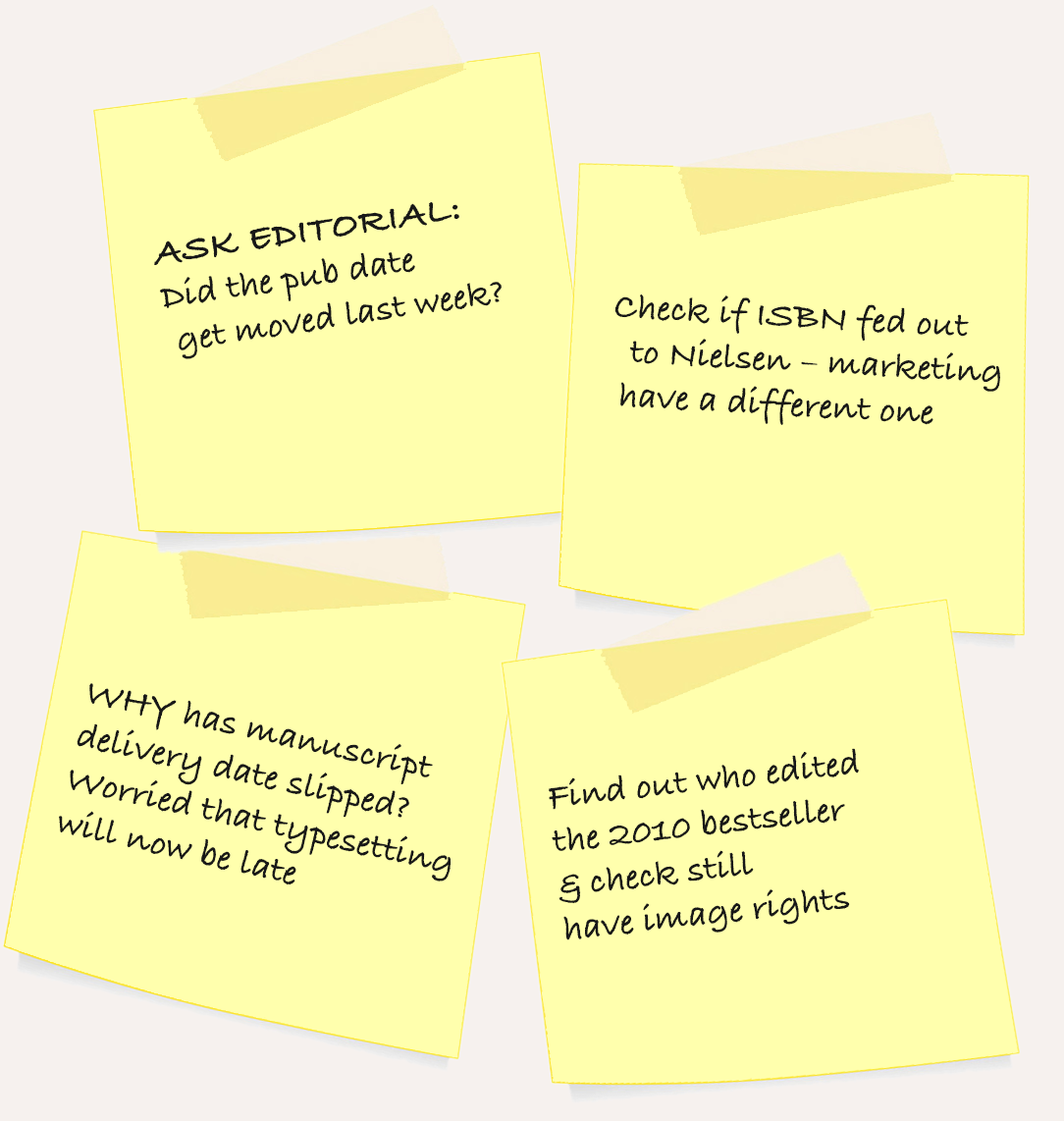
It's the question everyone in publishing dreads.
Like Anna, an editorial assistant at your medium-sized academic press. She went into publishing because she loves books, and has a real eye for language. But her job just seems to be updating Nielsen, the distributor, and myriad spreadsheets – and she's behind. There were a load of price and pub date changes at yesterday's production meeting: more copying and pasting for her.
Then there's managing editor Tom, who joined to help grow the academic social sciences list. But his time is consumed with trying to keep things on track. Did we say at the handover meeting that we are delaying twelve February titles because the line edit wasn't finished? Is anyone managing the freelancers?
And there's Juliet, a commissioning editor, who knows for sure that five out of the seven authors on her list will be late delivering their manuscripts. Again.
Juliet craves just one clear day to work on her list's strategy – but she's always busy firefighting. Everyone wants desperately for the list to grow, but there's too much confusion, too many moving parts.
Forget growth: keeping the wheels on is hard enough.
Sure, there's the rickety old ONIX database, and the publishing schedule on Excel. But everyone uses their own spreadsheet. There's endless copying and pasting into the distributor's system, to Nielsen and Bowker and Lightning Source and Coresource, to the Waterstones and Barnes & Noble grids, to the wholesalers: there's no way they all match.
Casting your eye around the office, you see multi-coloured A3 print-outs of scribbled-on spreadsheets, and monitors festooned with PostIt notes, providing further cause for concern.
More dates. More changes. More mismatched versions of the truth.
You long for some perspective. Do all publishers work like this? Surely there's a better way?
Imagine if there was.
What if your whole team – from editorial and sales to production and marketing – shared one system they didn't hate, set up from spreadsheet and ONIX-based importers that handle your enormous backlist and muddled contact data.
That checks not only the presence, but the quality of your data.
That automatically syncs with external systems. Coresource, Nielsen, retailers, wholesalers, your contracts, rights and royalties records, University systems, JSTOR, EBSCO – up to date, all the time.
That generates custom spreadsheets and beautiful advance information sheets, professionally designed to sell, just as easily as ONIX and JSON API feeds. The right format for humans, the right format for computers: both from the exact same source.
A system accessible from anywhere – Frankfurt, conferences, home offices, key account meetings – which the whole team edit at the same time on the web.
That assigns the thousands of to-dos in any publishing season to the right people, and relates them to a meaningful date. So when the print pub date moves, or the manuscript delivery is late, the relevant to-dos move in the system, and also in your team's Google and Outlook calendars.
A system backed up by unlimited access to publishing management experts, who've seen it all before and pool the combined knowledge of hundreds of other publishers who've overcome the same problems you're facing.
Instead of digging through endless conflicting spreadsheets, Post-its, notebooks, brains, email threads, Outlook contacts, Slack messages and Word docs: imagine the harmony from having a single, expert publishing system.
One that's beautiful, comprehensive, searchable, and a joy to use.
As publishers ourselves, we lived, breathed and suffered through the same problems you and your team face every day, for 15 years. No more. Publishing is hard. Consonance makes it possible.
If your team had the tools to work in harmony with each other, think how much time they would have to do the actual creative work. They can:
- Coach and manage authors, breaking down the writing process into smaller deliverables, increasing the chances of delivering their manuscripts on time thus fixing the greatest source of pain in publishing: late manuscript delivery.
- Sell more books. Writing better copy, briefing sales reps better, crafting manuscripts properly: adding the value that humans add best, expending effort where it can best be turned into revenue.
- Use the insights from better-managed data, and the bibliographic tools provided, to innovate in their publishing: remixing backlist content, generating an audio books programme, or researching new imprints and partnerships.
- Do the work instead of firefighting.
- Stick around longer, because work is a pleasant place to be.
- Result? Better organised, more creative, and under control.
Our rapidly-growing successful publisher clients don't have to dream. This is their reality.
And you don't have to imagine, either. Efficient publishing management doesn't have to be a dream. Growth is entirely possible. Our innovative, thriving clients prove it. We've love to talk to you about how you can join them. Book your demo today.
Are your current systems sabotaging your growth ambitions? Are you hungry to implement new business models, but concerned you lack the strong administrative foundations needed for innovation?
We're always amazed at how resigned publishers have had to become to the low bar in publishing management systems. Demand more.
Contact us via our contact form, or email us.